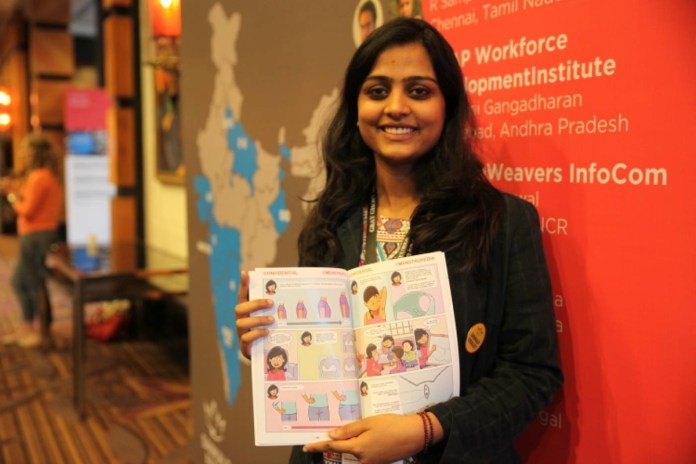Menstruation. Does the word make you uncomfortable? If it does, you should probably question yourself why. In our country, menstruation is such a big taboo that there’s almost no dialogue around it- which has adverse effects (especially) on adolescent girls who have no knowledge about this. So, we got in touch with Aditi Gupta, the founder and the creative brains behind Menstrupedia Comic, an illustrated guide to menstruation for girls and women which aims to break the taboos around it. She spoke to us about menstrual myths and taboos and why sex education is the need of the hour. This is a #MustRead, irrespective of your gender.
Hi Aditi. What motivated you to speak about such a tabooed topic of menstruation, especially in a country like India?

Menstrupedia is created by my co-founder and husband Tuhin Paul and I. It was created as a result of our own experiences of facing the taboo against menstruation. I got my first period when I was 12 and I was told to keep it a secret from others as if it was some kind of unspeakable sin. To put it simply, I was branded impure at that time of the month and even today you’ll see signboards outside temples and places of worship denying entry to menstruating women.

Such an outlook is humiliating and damages the self-esteem and confidence of a young girl. I grew up using rags. Washing them and reusing them and they weren’t pleasant to use and are supremely unhygienic. When Tuhin and I met in college and started dating, I told him about the inconvenience that I go through every month. He was shocked at the outlook that our society has towards this essential body process.
Together we read more about it and it struck us that even after having access to so many sources, we are so ill-informed about menstruation, there would be millions of girls out there who would be ill-informed too and this leaves them vulnerable to unhygienic menstrual practices. We took up a year-long research project and found that most girls in the urban and semi-urban areas were ill-informed about periods. Which is why we decided to create educational material about menstruation to remove the taboo against it by portraying it in a positive light and to help young girls learn about menstruation in a fun way.
Can you tell us a bit about the unique concept of using comic books?

The medium of the comic wasn’t our first choice. We wanted to create a board game and a computer game but we realised that anything that is computer-based would not work for the majority of the girls in India because then it would have to depend on access to electricity and the internet.
We got the idea of using comic books because during that time Tuhin was reading a lot about how the medium of graphic narratives have helped people to talk about challenging issues and our proto-type testing gave us very good results. In fact, our proto-type itself was used to teach more than 500 girls about menstruation.
That’s great. So, what are some of the myths and taboos around periods that Menstrupedia aims to bust?

A comic book is a non-threatening medium and whenever we talk about menstruation, we talk about it as being something that has to be kept secret. It’s dirty and it’s a bad thing and it shouldn’t be talked about. So a comic book becomes a very non-threatening medium.
So through Menstrupedia, we aim to bust myths around menstruation being a hush-hush topic. The characters and stories are inspired by reality so some of the stories are from my own personal life and som are from the people we talked to during our research. So Menstrupedia talks about the scientific part and the biological aspect of menstruation and aims to teach the girls that it is a part of life and there is nothing bad about it.
What would you say is the state of menstrual hygiene in India at the moment and what can we do to make it better?

The discussion around menstrual hygiene in India is not very encouraging. But it is certainly improving. Now people are seeing the problem and are accepting that there is a problem which is a great start. We still have 1 out of 4 girls dropping out of school when they get their period. 83% of the girls still don’t know what a period is when they get it for the first time.
But things are changing. There are more and more campaigns to talk about menstruation. Menstrupedia is currently in 16 languages and over 6,000 schools in India are using it to teach girls about menstruation, but it is still a very small fraction. Every year, 5 million girls hit puberty and it should reach all those girls before they get their first periods. So we still have a long way to go before we can make India a period positive country.
Why do you feel it’s especially important for young girls to read Menstrupedia?

There is very basic information that every girl needs to be prepared for menstruation and this information, the majority of the girls in our country are not receiving. The layer of taboo is a very hard shell to penetrate. Sex education in India is a complete disaster. There’s no communication about it at home. The girls are getting their first period in class 5 while the chapter on menstruation comes in class 7 and is often skipped by the teacher. Words like Vagina are censored.
So, a comic book is the perfect intervention that surpasses all these barriers. Menstrupedia enables the girls to enable themselves. The book is not just about menstruation and its biological process. It’s about nutrition, body positivity, how to deal with menstruation mentally and generally about the stigma around it and how to remove it. Menstrupedia needs to be read by every girl and woman in the country to free India from this menstrual taboo!
How do you personally feel the situation around menstruation can be made better in the country?

I personally feel that sex education in our country is not in place and we need to fix that. Menstruation is just a small component. Till we don’t fix this sex ed scenario, we are not going to attain gender equality, better reproductive health and girls at the leadership position. So fixing the sex education scenario in India is the solution to a lot of our problems! It is just the beginning, we still need to teach boys about their puberty, teach them about consent, redefine the idea of masculinity to them, we need to teach both boys and girls about contraception, talk about pregnancy and a lot more but first, as I said, we need to fix the quality of sex education in our country!
Featured Image Source: Thomson Reuters Foundation




